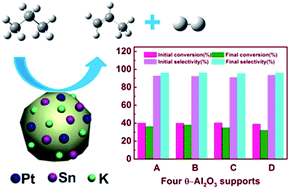Influence of support on the catalytic properties of Pt–Sn–K/θ-Al2O3 for propane dehydrogenation†
Abstract
A study on the performance of Pt(0.3 wt%)Sn(0.2 wt%)K(0.5 wt%) catalysts supported on four different θ-Al2O3 for propane dehydrogenation is reported in this study. The θ-Al2O3 used as supports were prepared by four different methods as (a) calcination of the commercial γ-Al2O3 at 1223 K for 12 h, (b) synthesis by hydrochloric acid reflux method, (c) precipitation of Al(NO3)3·9H2O with ammonia solution and (d) extrusion use pseudo-boehmite powder, respectively. They were characterized by using XRD, BET, SEM, H2-TPR, NH3-TPD, CO-chemisorption, XPS and TG-DTA methods to study which characteristics of the carrier will affect the performance of the catalyst. The results show that high acidity and strong interactions of the Sn support can improve the propane dehydrogenation activity of the catalyst, large pore volume and large pore diameter can enhance the stability of the catalyst. Al2O3 synthesized by method (b) has the largest pore volume, pore diameter, relatively high surface acidity and strong interaction with Sn, which meant the catalyst with the support prepared by method (b) showed the highest propane conversion and superior selectivity. The average conversion is 38.6% and the average selectivity is 95.2% during the reaction time of 25 h.



 Please wait while we load your content...
Please wait while we load your content...